The Big Fix
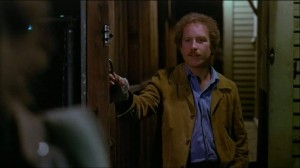 Is it hard to believe that the 1973 novel The Big Fix was released a whole year before the novel of Fletch? Is Fletch just a WASP-y version of The Big Fix’s Moses Wine? Jeremy Paul Kagan’s film version of The Big Fix, stars and was produced by Richard Dreyfuss, making the Jewish subtext unmistakable. Both Fletch and The Big Fix start out as shaggy dog comedies, with the leads whispering snarky punchlines under their breath, which is just a smarmy way of addressing the audience but assuming the other actors in the scene can’t hear you. Then, both films turn on a dime and become detective stories as the above-it-all leads have to solve a murder.
Is it hard to believe that the 1973 novel The Big Fix was released a whole year before the novel of Fletch? Is Fletch just a WASP-y version of The Big Fix’s Moses Wine? Jeremy Paul Kagan’s film version of The Big Fix, stars and was produced by Richard Dreyfuss, making the Jewish subtext unmistakable. Both Fletch and The Big Fix start out as shaggy dog comedies, with the leads whispering snarky punchlines under their breath, which is just a smarmy way of addressing the audience but assuming the other actors in the scene can’t hear you. Then, both films turn on a dime and become detective stories as the above-it-all leads have to solve a murder.
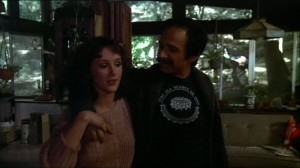 Of course, that’s pretty much where the subtext and nuance end in Fletch. Not that the movie isn’t amusing, but what works 25 years later is only Chevy Chase’s asides and Harold Faltermeyer’s score (he wrote the score for Beverly Hills Cop, which is obvious just from watching Fletch). In The Big Fix, the subtext is that Dreyfuss is only a private eye to cover his child support, and though he used to be a fiery hippie revolutionary, he’s slowly realizing that everyone he championed, protested with, or fought the good fight with, has become part of the system, whether it be a district attorney or an Abbie Hoffman type who now writes advertising slogans. The only counterculture types left are big phonies, new agey fops, like Dreyfuss’ ex-wife’s boyfriend, played by Ron Rifkin (who, behind a beard looks so much like F. Murray Abraham, that it’s a surprise when Abraham shows up for real later in the film, as if he was somehow playing two parts).
Of course, that’s pretty much where the subtext and nuance end in Fletch. Not that the movie isn’t amusing, but what works 25 years later is only Chevy Chase’s asides and Harold Faltermeyer’s score (he wrote the score for Beverly Hills Cop, which is obvious just from watching Fletch). In The Big Fix, the subtext is that Dreyfuss is only a private eye to cover his child support, and though he used to be a fiery hippie revolutionary, he’s slowly realizing that everyone he championed, protested with, or fought the good fight with, has become part of the system, whether it be a district attorney or an Abbie Hoffman type who now writes advertising slogans. The only counterculture types left are big phonies, new agey fops, like Dreyfuss’ ex-wife’s boyfriend, played by Ron Rifkin (who, behind a beard looks so much like F. Murray Abraham, that it’s a surprise when Abraham shows up for real later in the film, as if he was somehow playing two parts).
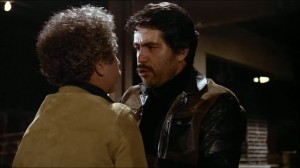 There’s no solid ground for Moses Wine, which explains why the only people he can trust to help him solve a political conspiracy are his kids, who he bounces ideas off of and his sister, sequestered in some sort of Jewish nursing home. Corruption is so accepted in The Big Fix, that there’s hardly a character who can escape it. Moses may be working cases as an industrial investigator, but he’s also willing to sell himself out just to get with an ex-girlfriend. “Some people sell out for seven minutes on a talk show,” he says, which might be a reference to Dreyfuss’ own partial blacklisting for the way he would, while on Johnny Carson or some equivalent, tear down the movies he was in, before they were even finished. He did it on Jaws and it only got slightly better for Close Encounters of the Third Kind. Both times the problem seemed to be that the special effects required made the acting a guessing game, so The Big Fix, has nothing in the way of fancy optical or tricky camerawork or anything that might be mistaken for too much self-conscious artistry. Kagan, who made The Chosen a few years later, was mostly a TV director, and his unsubtle point-and-shoot aesthetic can be boiled down to a street sign that Moses sees when he’s down in the dumps. The sign reads “hope.”
There’s no solid ground for Moses Wine, which explains why the only people he can trust to help him solve a political conspiracy are his kids, who he bounces ideas off of and his sister, sequestered in some sort of Jewish nursing home. Corruption is so accepted in The Big Fix, that there’s hardly a character who can escape it. Moses may be working cases as an industrial investigator, but he’s also willing to sell himself out just to get with an ex-girlfriend. “Some people sell out for seven minutes on a talk show,” he says, which might be a reference to Dreyfuss’ own partial blacklisting for the way he would, while on Johnny Carson or some equivalent, tear down the movies he was in, before they were even finished. He did it on Jaws and it only got slightly better for Close Encounters of the Third Kind. Both times the problem seemed to be that the special effects required made the acting a guessing game, so The Big Fix, has nothing in the way of fancy optical or tricky camerawork or anything that might be mistaken for too much self-conscious artistry. Kagan, who made The Chosen a few years later, was mostly a TV director, and his unsubtle point-and-shoot aesthetic can be boiled down to a street sign that Moses sees when he’s down in the dumps. The sign reads “hope.”
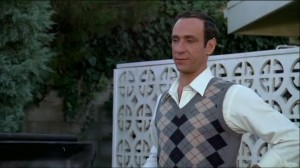 Subtlety isn’t the only thing Kagan is lacking, The Big Fix has that standard rough 1970s sound design where everything not only sounds dubbed but also poorly cut together. When Moses is revealed to be a gambler, the sports scores are always reported backwards, as if Kagan didn’t know any better, with the losing team’s score stated first (San Francisco 9, San Diego 24). Kagan doesn’t restrain Dreyfuss and stop him from his own worst enemy. Dreyfuss’ instinct early in his career was to try to appear cute and knowing, “you made one hell of a mistake with me… Breaking up.” But Dreyfuss also gets off a number of different clever jokes about his arm, which is in a cast. Constantly making up new reasons for it, “a barfight with a barcher” (in real life Dreyfuss’ broke his wrist and so they worked it into the film), Dreyfuss at least adds a layer of self-depreciation with the gag.
Subtlety isn’t the only thing Kagan is lacking, The Big Fix has that standard rough 1970s sound design where everything not only sounds dubbed but also poorly cut together. When Moses is revealed to be a gambler, the sports scores are always reported backwards, as if Kagan didn’t know any better, with the losing team’s score stated first (San Francisco 9, San Diego 24). Kagan doesn’t restrain Dreyfuss and stop him from his own worst enemy. Dreyfuss’ instinct early in his career was to try to appear cute and knowing, “you made one hell of a mistake with me… Breaking up.” But Dreyfuss also gets off a number of different clever jokes about his arm, which is in a cast. Constantly making up new reasons for it, “a barfight with a barcher” (in real life Dreyfuss’ broke his wrist and so they worked it into the film), Dreyfuss at least adds a layer of self-depreciation with the gag.
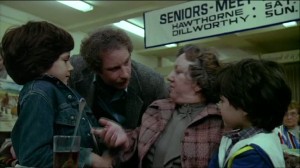 The small roles in The Big Fix tend to be the highlights; John Lithgow with hair, Larry Bishop, playing his part as if he was trying to show Judd Nelson everything he needed to know for his upcoming career, and Mandy Patinkin, who in 30 seconds as a stoned pool cleaner, practically steals the whole movie. The convolutions of the mystery plot are secondary anyway, and even with the relevance of some of the issues (there’s a policy discussed that sounds awfully similar to the immigration law that Arizona has tried to pass), the key thing to take away from the film, other than Dreyfuss constantly fooling around, is the wonderful irony that Dreyfuss is able to blackmail all his former revolutionary friends by threatening to tell everyone all the good things they were a part of. No one needs to know that they might actually be decent, upstanding people.
The small roles in The Big Fix tend to be the highlights; John Lithgow with hair, Larry Bishop, playing his part as if he was trying to show Judd Nelson everything he needed to know for his upcoming career, and Mandy Patinkin, who in 30 seconds as a stoned pool cleaner, practically steals the whole movie. The convolutions of the mystery plot are secondary anyway, and even with the relevance of some of the issues (there’s a policy discussed that sounds awfully similar to the immigration law that Arizona has tried to pass), the key thing to take away from the film, other than Dreyfuss constantly fooling around, is the wonderful irony that Dreyfuss is able to blackmail all his former revolutionary friends by threatening to tell everyone all the good things they were a part of. No one needs to know that they might actually be decent, upstanding people.




Will E. says:
July 30th, 2012
5:46 pm
At least the movie left out the bizarre Satanic cult angle from the novel!